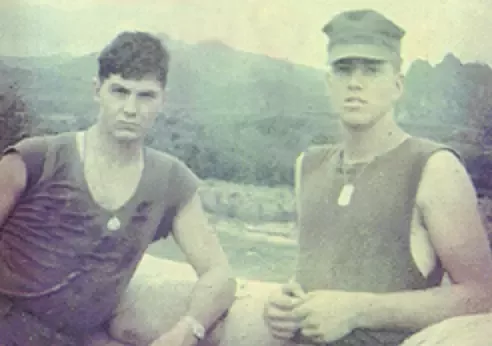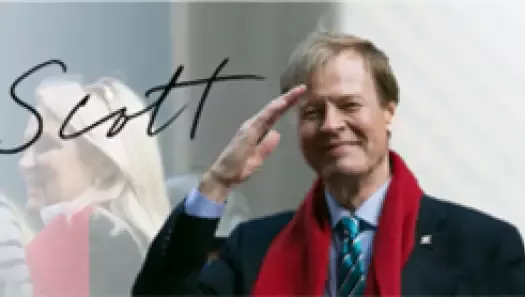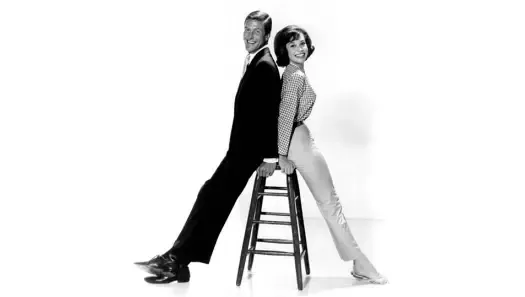HeroVet: Ed McSorley, Vietnam Veteran

"As a child of the 50s and 60s, military service was an obligation and a right of passage," Ed McSorley told some 250 students attending a post-Memorial Day workshop last year at New Canaan (Connecticut) High School. To the young men and women living privileged lives to whom the youthful middle-aged veteran bared his soul, service in the military was something beyond the realm of their experience. For most, college was next on their horizon, to be followed by good jobs and successful careers.
But on that day they gathered to learn something from the preppily-dressed Institutional equity salesman about those who died in service to the nation.
"With the ending of the draft in 1970," Ed McSorley told them, "many of my generation, and younger, never served in the military. Of the 280 employees at my New York office" - Ed earns a comfortable living working at J. P. Morgan in New York City - "only five of us are veterans." And only Ed and one other saw service in Southeast Asia during the Vietnam War. His experience illustrates what the author Myra McPherson once wrote, "Vietnam was a war that asked everything of a few and nothing of most of America."
Ed McSorley, a son of Ossining, New York, was one of the few.
One Good . . . Boy
Ed enlisted in the Marine Corps when he was all of 17, much to the consternation of his mother, who had to sign for him. The service, though, offered him a way to pay for college. A year later he was a veteran, "retired" from the military because of the extensive wounds he had received in combat. His military experience was, he told the students, "profound."
"My Marine training was tough," he said. "We were well prepared both physically and mentally" for combat, and at Parris Island, the Corps was up front about casualties. "We were told we should expect a 40% casualty rate," he said. They were off by 60%: of the 13 men Ed became close with - "We called ourselves the ‘Filthy Few’ because we were usually coated in mud" -- only five survived. All were wounded.
Ed was sent to Vietnam in 1968, the bloodiest year of the war. While most Americans who followed the events of that year remember the Tet Offensive that began on January 30, few recall that the Viet Cong and their cohorts in the North Vietnamese Army began a second bloody offensive three months later. Ed’s unit - he served with 3rd Battalion, 9th Marines, 3rd Marine Division - "caught the brunt of that campaign," he said. On April 30, while Lance Corporal McSorley and his mates were on "easy duty," sweeping for mines the road between the Rockpile and Camp Carroll in Quang Tri province, just south of the Demilitarized Zone, the NVA attacked.
In the ensuing firefight, Ed was seriously wounded by mortar and small-arms fire. Unable to move to find cover, he was an inviting target when one of his buddies, Bob Leahy - "my Guardian Angel, a man I still pray to every day" - rushed out, braving the intense enemy fire. Although hit in the leg, Leahy was able to carry his friend to safety.
Five weeks later, Bob Leahy was killed in action.
Last Rites - and Eight Units of Blood
Ed, meanwhile, his body peppered with shrapnel and bullet holes, didn’t think he was going to make it. Neither did some of the corpsmen in the field. He was bleeding profusely and losing a lot of blood. Intense enemy ground fire prevented the MedEVac helicopters from landing.
Ed was given last rites in the field.
Then, all of a sudden, several choppers braved the enemy fire and managed to land. One of them set down near where Ed was lying. His buddies literally threw him onto the chopper, which took off into heavy fire. Within minutes, he was at Delta Med in Dong Ha, where he was infused with eight units of blood. He had come close - very close - to having bled to death.
Lying naked on a gurney, in intense pain, he looked down at his body "and saw all the holes. But I also looked at the guys next to me. One had lost his legs; the other was gun shot." While Ed may not have been lucky, he was alive. One hundred, thirty-nine NVA were killed during that fight, with heavy casualties suffered as well by the Marines.
Getting His Life Back
His odyssey of recovery took him to Japan, and then to Walter Reed Army Hospital in Washington, D.C., and finally to the naval hospital at St. Albans, Queens, New York. He recalls one sobering moment: Arriving at Andrews Air Force on a Sunday morning after leaving Walter Reed on a stretcher in a bus with 15 or 20 other badly wounded soldiers, they were greeted by antiwar demonstrators hoisting placards and throwing objects. Ed was appalled.
A few months later, in October 1968, Ed McSorley was honorably discharged from the Corps. He was given a 70% disability rating by the VA. He was 18 years old.
Ed went to school, to Bryant College in Smithfield, Rhode Island, where he kept "a low profile. I didn’t want anyone to know I’d been in the service. And except for the scars, which I kept hidden, no one looking at me would have imagined I’d been to Vietnam. I didn’t even shave till I was 20."
His Marine training, though, stuck with him. He adopted a can-do attitude. If you want something, you’ve got to work hard to achieve it. He became organized and focused. He graduated with honors, then went on to earn his MBA from Fordham University in New York City. He got married. He took his first job on Wall Street with a firm that is now Prudential Securities. He fathered three children. He has lived the life he chose, and made it into a success, a contradiction of the Vietnam vet-as-victim stereotype.
For years he never spoke of Vietnam, except to a few of those with whom he served and stayed in touch. "And no one in my family ever asked about my experiences," he said.
Even after he was appointed to the New York Vietnam Veterans Memorial Commission by Mayor Edward I. Koch in 1984, Ed kept his memories to himself. Then, two years ago, he agreed to speak to young people in New Canaan, where he and his family have resided since 1990. He has also addressed other students in Wilton, Connecticut.
Why did he "come out" as a veteran? Because, he says, "You never forget. Every time I drink a glass of cold water I’m grateful." Speaking to the students, Ed shared a quote he’d read somewhere: "‘If we wish peace in the years ahead, we must love and honor those who have paid the ultimate price to keep us free.’
"I know it is hard for most civilians to comprehend the price paid by those who have died," Ed said. "But it fills veterans with the responsibility to make sure that they are not forgotten."



